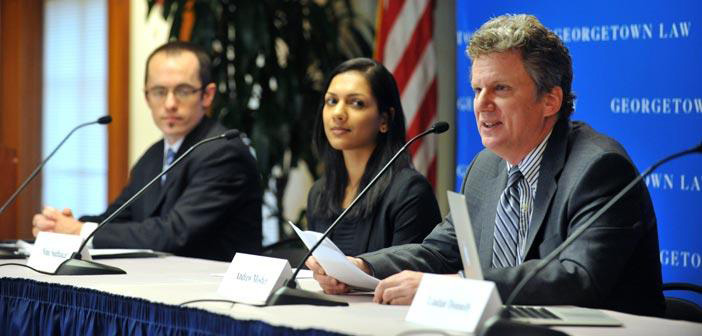
This year’s Samuel Dash Conference on Human Rights at Georgetown Law focused on “Jurisdiction for Mass Atrocities.” The April 8 conference included a panel discussing the Enough Project-supported experiential learning course, which was highlighted in an article published April 15 by Georgetown Law.
The course, titled “Suing Sudan: Constructing International Human Rights Cases,” is co-taught by James Bair, associate at the law firm Brown Rudnick and adjunct professor at Georgetown Law Center, and Mark Quarterman, Research Director at the Enough Project. Relying heavily on evidence gathered by the Enough Project and the Satellite Sentinel Project, the experiential learning course enables students to examine the current human rights violations committed by both state and non-state actors in Sudan, and become active participants in investigating possible applications for different mechanisms of international law in the effort to prosecute perpetrators in Sudan.
The article by Georgetown Law featuring the practicum course highlighted remarks made by the Samuel Dash Conference panel that consisted of Adjunct Professor James Bair and his students. Professor James Bair explained, “We approached Georgetown about designing a practicum in which students could analyze the international instruments to which Sudan is a party — and apply those instruments to the mounting evidence of Sudan’s crimes.”
Building on Professor James Bair’s introductory remark, a student panelist Andrew Mosher (L’14) described the Sudanese military’s innumerable crimes such as alleged bombings, burning and looting of villages, and 700,000 refugees denied access to humanitarian government, “I can picture all the legal minds in this room thinking that violates [international law]. If that’s what you were thinking, welcome to our class.”
The article also featured two students, Nina Sudhakar (L’13) and Liadan Donnelly (L’14) who talked about the challenges of figuring out how and where to sue Sudan.
Photo: Adjunct Professor James P. Bair(left) and his students (Georgetown Law)

